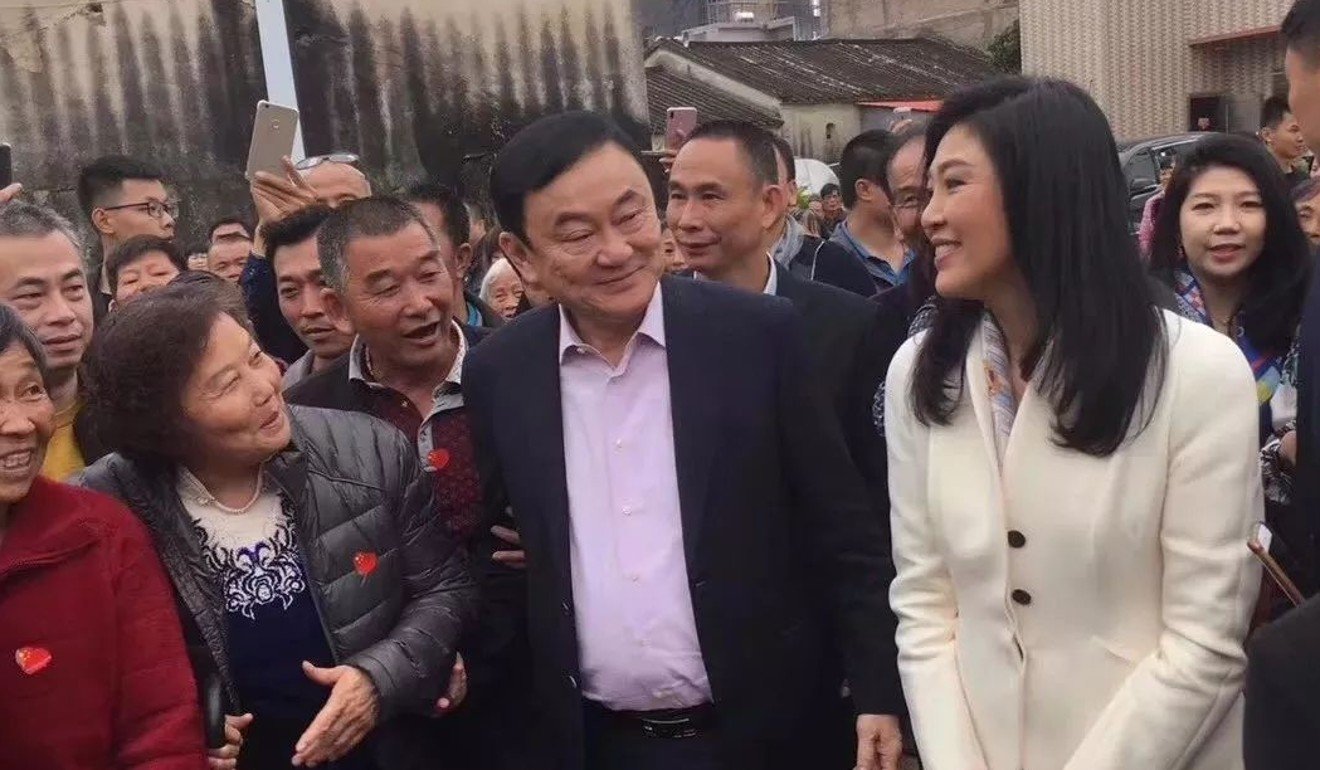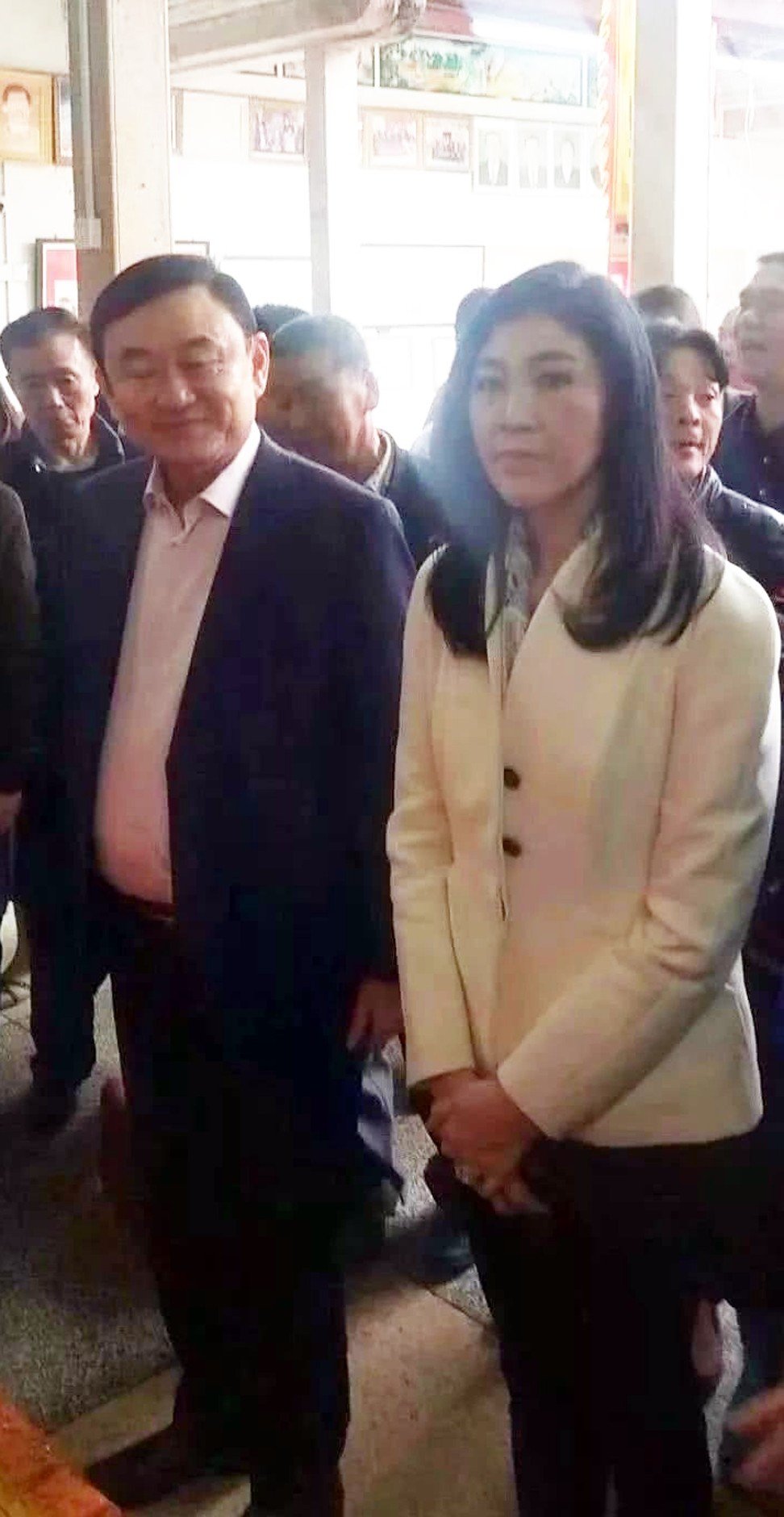
Beijing treads carefully when scions of Thai political dynasty arrive in China in search of their roots
- Chinese censors set to work after exiled Thai leaders visit Guangdong
- Low-key reception demonstrates how sensitive relations with kingdom are
Former Thai prime ministers Thaksin and Yingluck Shinawatra may have been made very welcome in southern China at the weekend when they visited the homeland of their ancestors, but Beijing was a little more circumspect, censoring media coverage of their visit and underscoring how China treads carefully where Thai politics are concerned, analysts said.
Brother and sister Thaksin and Yingluck arrived at Taxia village in Fengshun township, Meizhou, Guangdong province, in search of their roots on Saturday. They are fourth-generation Chinese immigrants in Thailand and descended from a family of Hakkas.
Yingluck posted video of their arrival on her Instagram account on Sunday, complete with a caption that said: “Chinese people flocked to welcome Thaksin and Yingluck, who came to pay respect to their Chinese ancestors.”
In the video, the sister and brother get out of a black car accompanied by an entourage of men in black suits. Chinese residents were eager to press flesh with the pair, while Yingluck and Thaksin smiled and chatted.
They also visited their clan’s relatives in the village and then worshipped ancestors at the village ancestral hall, Nfplus, a state-backed mobile news app operated by Guangzhou-based Nanfang Daily, reported.
Their great-grandfather, Seng Saekhu, left Guangdong in the 1860s for what was then Siam.
While a resident told the South China Morning Post that the local government had prepared for “prominent Thai” visitors, mainland media and online social media that published photos and video of the visit that day had deleted it by Sunday afternoon.
The Shinawatras are in self-imposed exile after they were pushed out of high office by military coups in 2006 and 2014 respectively.
Thailand has been ruled by a military junta since May 2014, when the army toppled Yingluck’s government.
Their appearance in China came at a time when Thai politics has been thrown into uncertainty. Last week, the junta again delayed polls – planned for February – in what would have been the first election since the 2014 coup.
Elections could reset the balance if democracy is restored in Southeast Asia’s second-largest economy. The Shinawatras were expected to challenge the military’s governance as they still call the shots in Pheu Thai – the political party found by Thaksin in 2008.

Chong Ja Ian, a professor of foreign policy at the National University of Singapore, said China’s wary approach to the Shinawatras’ visit showed how reticent Beijing was to becoming embroiled in Thailand’s domestic politics.
“The PRC government wants to be careful about who they look like they support, even if they are trying to work with all the sides,” Chong said. “I think there is a potential that they could get drawn into the domestic political debate in Thailand that is deleterious to Chinese interest in Thailand and also Southeast Asia.
“Essentially, the perception [of the reporting of the pair’s visit] is that it looks like the Chinese government is supporting a particular side in the election in Thailand, this would fuel all the suspicions that China is meddling with domestic politics in its neighbourhood and elsewhere.”
Xu Liping, a professor with the Institute of Asian-Pacific Studies at the Chinese Academy of Social Sciences in Beijing, said China was also trying to manage relations with the governing junta as well as with the exiled brother and sister.
“China wants to show their allies that they will show a friendly attitude to former leaders as long as they have been friendly to China during their ruling time … This could motivate those who are in place to be more fearless in maintaining their China friendly position,” Xu said.
“However, this kind of gesture is not suitable for propaganda in this case, as they are still fugitives from the current Thai government’s perspective,” Xu said.
While Thaksin was known to be based in Dubai and the junta has sought extradition of Yingluck from Britain, they are reported to have been seen in Japan, Singapore and Hong Kong in the past year.
They were seen in Beijing in February buying chestnuts ahead of the Lunar New Year. That same day, Thaksin’s youngest daughter posted a photo of her father on Instagram with the caption, “Dad asked me to send his Lunar New Year greetings from Beijing to all Thais.”
Yingluck was in 2017 sentenced in absentia by Thailand’s Supreme Court to five years in prison for negligence in handling a rice subsidy project that resulted in huge losses to state coffers. She fled the country in August 2017 ahead of the verdict and called the case a politically motivated one. Thaksin was ousted as prime minister in a military coup in 2006. He fled abroad to avoid a corruption conviction.
It was reported that Thaksin Shinawatra had paid a visit to Meizhou in 2005 and went there again, with his sister, in 2014.
Additional reporting by William Zheng



